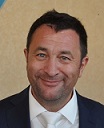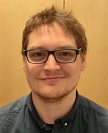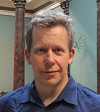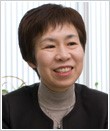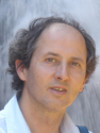
|
|
|
Lecturers
Franck Artzner, University of Rennes, France Franck Artzner is a CNRS research director at the Physical Institute of Rennes (France). He heads the Joint Laboratory Archi-Pex with IPSEN, which investigates commercial formulation of self-assembled peptides. He was chairperson of the Bio-inspired Nanotechnologies group at OMNT. He is involved in the review committees of synchrotrons. He recently received the Delalande prize from the French Pharmaceutical academy. He is interesting in mimicking natural self-assemblies to create new materials. His group has a strong expertise in technical development as well as crystallographic characterization of structures by unconventional X-ray scattering techniques, SAXS, Fiber Diffraction... Franck Artzner will lecture us in Characterization of self-assembled materials focusing on the diffusion techniques.
André Gröschel, Physical Chemistry and Centre for Nanointegration, University of Duisburg-Essen, Germany André Gröschel studied chemistry at the University of Bayreuth and graduated in 2012 in Chemistry working with Axel H. E. Müller on block copolymer synthesis and hierarchical self-assembly of multicompartment nanostructures. From 01/2013-12/2015 he joined the group of Olli Ikkala at Department of Applied Physics of the Aalto University School of Science in Helsinki (Finland) pursuing his postdoc on biomimetic nanocomposites and photonic materials. In 01/2016, he received an endowed Evonik-Professorship and moved to the University of Duisburg-Essen (Germany), where he is now group leader in the Department of Physical Chemistry. In 2017, he was awarded an Emmy Noether Independent Research Group from the German Research Foundation. The group currently consist of 9 graduate students located at the Nano Energy Technic Center in Duisburg. He has published over 30 papers and 2 book chapters. He is member of the German Chemical Society, the German Colloid Society and the Centre for Nanointegration, and is currently Guest Editor of a Special Issue of Polymer. His research interests comprise block copolymer synthesis, self-assembly, electron tomography, liquid cell TEM, block copolymer microparticles, mesoporous carbon, inverse micelles, photonics and energy conversion. André Gröschel will lecture us in High precision synthesis and assembly of macromolecules.
Nicholas A. Kotov, University of Michigan, Ann Arbor, USA Nicholas A. Kotov is Professor of Chemical Engineering at the University of Michigan in Ann Arbor since 2003. He heads the Kotov Lab and is internationally renowned for his pioneering contributions to biomimetic nanostructures. In this large interdisciplinary research fields, he has been working on the topics of layered biomimetic nanocomposites, self-assembly of nanoparticles, and chiral nanostructures. Nicholas Kotov serves as an Associate Editor for the journal ACS Nano and as an advisory board member of several other nanotechnology journals. He has received awards and recognitions from a number of different countries, international organizations, and multinational corporations. These include the 2017 Colloid Chemistry Award of the American Chemical Society, the 2016 Stephanie Kwolek Award of the Royal Society of Chemistry, the 2016 UNESCO Medal for Development of Nanoscience and Nanotechnologies or the 2014 MRS Medal. More information
Kazue Kurihara, Tohoku University, Japan Kazue Kurihara is Professor at the Tohoku University since 1997 and heads the Kurihara Laboratory (Advanced Institute for Materials Research (AIMR) and the Institute of Multidisciplinary Research for Advanced Materials (IMRAM)) focusing on Physical Chemistry, Supramolecular Chemistry and Nanotechnology). Started her carrier in the field of bio-mimetic chemistry, specifically on photoreactions in micelles and lipid bilayer liposomes, Prof. Kurihara extended her research to preparation of nanoparticles of noble metal catalysts and semiconductors in microemulsions and in vesicles, which presented very early examples of this kind of research, then to molecular recognition on surface monolayers when she demonstrated, for the first time, that the efficient hydrogen bonding interaction is possible at the air-water interface. Since early 90’s, she has been actively involved in surface forces measurement both in developing measurement methodology and understanding surface forces in liquid media. In recent years, she is well known in her study on confined liquids, for which her original resonance shear measurement is employed. This study revealed interesting properties of confined water, ionic liquids, liquid crystals, lubricant oils etc… Her achievements have been recognized by various awards including 2016 SPSJ Award for Outstanding Achievement in Polymer Science and Technology, IUPAC 2013 Distinguished Women in Chemistry or Chemical Engineering Award, A.E. Alexander Lectureship Award 2011 from Australian Chemical Society, and 2000 The Chemical Society of Japan Award for Creative Work. More information Kazue Kurihara will lecture us in Molecular assemblies and surface interactions.
Marcus Müller, Institut für Theoretische Physik, Georg-August-Universität, Germany Marcus Müller received his Ph.D. in theoretical physics in 1995 from the Johannes Gutenberg-Universität in Mainz, Germany working with Kurt Binder on structure and thermodynamics of polymer blends. After a TRACS visit at the EPCC Edinburgh, working with Mike Cates on ring polymers, he went as a Feodor Lynen fellow to the University of Washington, where he worked with Michael Schick on homopolymer/copolymer mixtures and, recently, fusion of model bilayer membranes. He returned back to Mainz and obtained his Habilitation in theoretical physics in 1999. Before joining the ITP in Göttingen, he was an associate professor in the department of physics at the University of Wisconsin-Madison, a Hochschuldozent at the University of Mainz, and a Heisenberg fellow of the German Science Foundation (DFG). He did research at the IFF, Jülich, Germany and the INIFTA and CNEA, Argentina. The APS awarded him the 2004 John H. Dillon Medal. In the same year he received a Lichtenberg professorship from the Volkswagen foundation to study biophysical models for collective phenomena in membranes. His research interests focus on computational soft matter, in particular the phase behavior and interface properties in polymer blends, solutions and amphiphilic systems. Quantitatively comparing computer simulations and numerical self-consistent field calculations, he investigates wetting and phase behavior in thin films, self-assembly of copolymers and binary brushes, the kinetics of phase separation, and coarse-grained models for membranes. More information
David Pine, New York University, USA David Pine is Silver Professor of Physics and Chair of the Department of Chemical & Biomolecular Engineering at New York University. His research interests focus broadly on self-assembly of nano and mesoscale materials, with particular interests in colloids and emulsions. Recent projects include the development of patchy colloids, lock-and-key colloids, DNA-coated colloids, light-activated colloidal swimmers, and random organization of driven particle suspensions far from equilibrium. He is also interested in the optical properties of soft materials and was one of the original developers of diffusing-wave spectroscopy, a light scattering technique for probing the dynamics of optically dense multiply-scattering materials. He has taught at Haverford College, worked at Exxon Corporate Research, and held faculty positions at UCSB in chemical engineering and materials before moving to New York University in 2005. He holds an appointment as Fellow Professor of Polymer Science & Engineering at Sungkyunkwan University in South Korea. Previously he was Adjunct Professor of Chemical Engineering at KAIST in South Korea. More information David J. Pine will lecture us in Screened Coulomb interactions, steric polymer brush, Depletion interaction (including lock-end-key binding), DNA-mediated interactions and directional interactions.
Francesco Sciortino, Universitá La Sapienza, Roma, Italy Francesco Sciortino, presently professor of condensed matter physics at Sapienza, Universita' di Roma, graduated from Palermo University in 1989. He was post-doc in the group of Prof. Eugene Stanley at Boston University (1989-1991). He then moved to C.R.S.4 in Sardinia (Italy) to work in the group of Prof. Clementi (1992) before moving to Rome in 1993 where he has been since then. During his career he has been visiting professor at Université de Bordeaux, University of Western Ontario, ESPCI Paris, New York University and Princeton University. His research interests include the physics of supercooled liquids, liquid-liquid transitions in one component system, the mechanisms of dynamic arrest (glasses and gels), self-assembly, aggregation and cluster phases in disordered systems, the physics of patchy colloids. He is author of more than 370 publications in international journals, which have received more than 18000 citations. His ISI-WOS h-index is 74. The complete list of publications is available at http://glass.phys.uniroma1.it/sciortino/publications.htm Francesco Sciortino will lecture us in Entropy and self-assembly.
|
